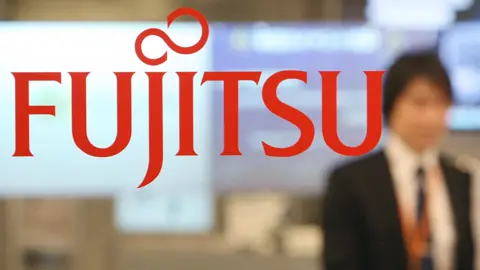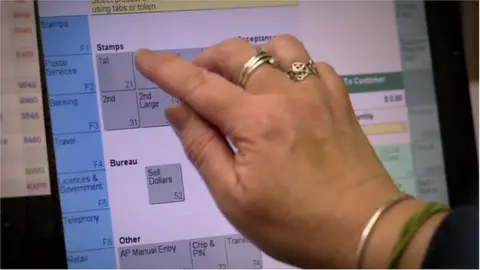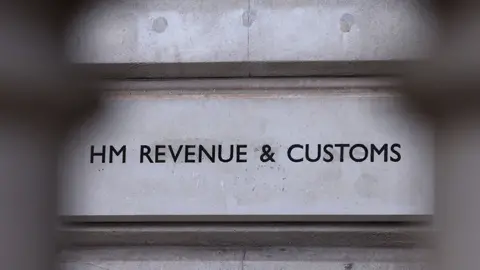Fujitsu Japan remains tight-lipped on the Post Office scandal
 PA Media
PA MediaJapanese firm Fujitsu is once again in the spotlight as victims of the Post Office scandal question what role it played. More than 900 Post Office branch managers were convicted when faulty accounting software made it look as though money had gone missing from their sites. That software, named Horizon, had been developed by Fujitsu.
A senior Fujitsu executive will be questioned by MPs next week. So how did a Japanese company, generally known to Brits as a maker of laptops, become embroiled in one of the most widespread miscarriages of justice in UK legal history?
It may be difficult to believe, but in Fujitsu's home market, hardly anyone has heard of the Horizon scandal. Japan's mainstream media didn't report on it until this week.
"Horizon? What's Horizon?" was the reaction of a former company president in Tokyo when the BBC asked him about it in 2022.
This is a person who had worked at the firm for nearly four decades.
The current president, Takahito Tokita, has turned down our multiple interview requests since 2022, most recently this week, even when I asked for a written comment he may wish to make to the victims whose lives were turned upside down.
The Horizon scandal saw some sub-postmasters attempt to plug huge shortfalls with their own money, after IT errors made it appear that thousands of pounds were missing. Some even re-mortgaged their homes.
Hundreds ended up with criminal convictions for false accounting and theft, and some went to prison. Many were financially ruined and have described being shunned by their communities. Some have since died.
On Friday, Fujitsu's Japanese headquarters told the BBC: "Fujitsu regards this matter with the utmost seriousness. The current statutory Inquiry involves the investigation of complex and sensitive events that have unfolded over many years.
"Our UK subsidiary has been co-operating with the Inquiry and remains fully committed to supporting the process. Out of consideration for the ongoing investigation, Fujitsu will refrain from further comment for the time being."
 Getty Images
Getty ImagesTo understand Fujitsu's role, let's go back to its takeover of the British firm International Computers Limited (ICL) - which developed the Horizon software - in the 1990s.
The relationship between ICL and Fujitsu goes back decades, and the ways in which both operate are quite similar.
In the 1970s, the Japanese government was trying to counter the dominance of America's IBM, and provided 57bn yen of financial support to three giant technology alliances, one of which was Fujitsu.
In the UK, the Wilson government was doing just that by forming ICL.
With the might of the government behind them, Japanese firms went on a shopping spree in the 1980s, encouraged by the favourable exchange rate.
That was when ICL was having financial issues at home. It held several UK government contracts, as the government had a policy that every computer over a certain size was bought from the company. But the firm was struggling to keep up with its international competitors, and by 1981 it had lost £18.7m.
Fujitsu and ICL were a perfect match. The takeover allowed Fujitsu to have an outsized presence in the UK, as ICL's strong ties to the government often meant that it was the only bidder for government contracts.
Previous problems
Even after the Horizon scandal, Fujitsu's products are deeply entrenched in the government's IT infrastructure.
To the anger of some MPs, the company has still been winning new government contracts and it was one of the biggest IT suppliers to the UK government until recently, according to procurement analysts Tussell.
Over the past four years, Fujitsu has won 101 contracts worth £2bn, according to Tussell. The Post Office has also paid Fujitsu £95m for an extension to the contract for Horizon.

The government has removed Fujitsu from its list of preferred suppliers, but the firm is still able to win contracts through the normal procurement process.
Horizon was not the first Fujitsu-developed software that has created problems for the UK government.
In 1999, the firm won a £184m contract to develop Libra - a software meant to standardise case management transactions across more than 300 magistrates' courts.
In the end, it cost nearly three times more than expected, and the National Audit Office concluded that it was not able to produce even basic financial information.
Horizon was installed at the Post Office around the same time. But its flaws were already known by then because it could not fulfil the requirements of its original project, an automated system for benefits payments announced in 1994.
"Horizon was offloaded to the Post Office to try to salvage something from the failed scheme," says IT journalist Tony Collins, who has covered the industry for decades.
Then, there was a lawsuit over an NHS project.
Fujitsu was one of four companies tasked with digitising the NHS in 2004. But after repeated delays and failure to deliver the promised product, the NHS terminated its contract with Fujitsu in 2008.
The Japanese company sued and won the case in 2014, which cost the UK government £700m.
With Fujitsu coming under increased focus, Justice Secretary Alex Chalk has suggested that if the firm is found culpable it should repay the "fortune" spent on the Post Office scandal.
Mr Chalk said the UK government would seek "proper recompense on behalf of the taxpayer" if the "scale of incompetence is as we might imagine".
 Getty Images
Getty ImagesFujitsu's products are so deeply entrenched in the government's IT infrastructure, it may be near impossible to remove them, according to Mr Collins.
"If Fujitsu pulled the plug on the Post Office, which you wouldn't do, post offices would cease to function. Government cannot do without Fujitsu."
The firm supplies large IT systems to the tax authority HMRC, the Department for Work and Pensions and other parts of government, Mr Collins explains.
Troubles at home
Fujitsu's software has not been without controversy in Japan.
Last year, the company was forced to suspend its system which issues residence cards to holders of the country's 'My Number' ID card due to technical issues.
In 2020, its president also apologised for a glitch that caused an all-day trading suspension on the Tokyo Stock Exchange (TSE).
It was also blamed in 2005 for a $300m trading loss when its software, installed at the TSE, was unable to cancel an incorrect order. The TSE and the securities firm involved fought a decade-long legal battle, with the court eventually ruling in 2015 that Fujitsu as a software developer wasn't legally liable, and that the TSE must pay the securities firm.
Despite this, Fujitsu continues to play a major role in the public and private sectors.
But as the company comes under the spotlight in the UK, its British subsidiary appears to be losing the preference from the government it once enjoyed.
Update 14 January: This is an update of a piece originally published in October 2022 and comes ahead of the questioning of a senior Fujitsu executive by MPs.
